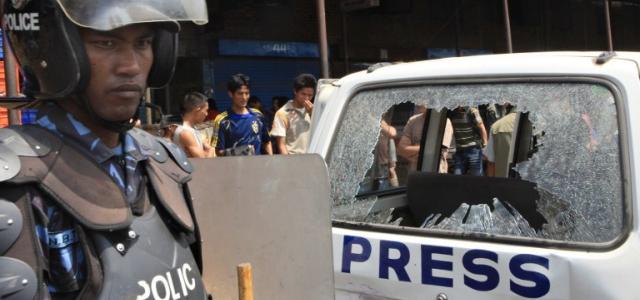Freedom for Nepal's Media is a Long Road Ahead

KATHMANDU: Journalism is a noble profession. The remuneration from it, however, is dismal. According to Press Freedom Index 2016, Nepal now ranks 105 in the world. The ranking absolutely showcases little improvement that the nation in South Asia has made but is significant as it's in the second place after Bhutan. Press freedom in Nepal is improving eventually although national problems have stifled the growth of journalists.
The first problem that Nepali journalists face is salary. It is only recently that the Nepal government has proposed to allocate the minimum salary to be Rs. 19,000 for a journalist working in a national media. The policy is not clear whether the fixed amount is for all journalists working in various sectors. The sad part is that most media houses have expressed their dissatisfaction with this decision by the government. Also, the way traditional media sector is built startles everyone. For those who do not know how it works, I'd like to share something about it—Nepali journalists are overworked, underpaid and face abuses from within and without. Long working hours with no incentives makes this profession less lucrative to the younger generation. The ones who face the brunt are those in low-ranks. Editors enjoy handsome salary with perks and as the ranking befalls top to bottom—the reality is gross.
Second,is the economic model of the Nepali media. Most print media houses in Nepal have survived the power-cuts, political upheavals, and protests. The Press Freedom also indicates that Nepal's global ranking is improving and the key threats for journalism are covering protests and crimes. Despite these hurdles, media houses have churned massive money and in return, they have swallowed their integrity by not paying journalists and even if they do it is harrowing. This doesn't even give sense to anyone as how can a journalist work for hours and not get paid well in return. The answer is simple, as most Nepali editors would say it, that the path of a journalist is turbulent so a person needs to be grilled. The problem here though is how can media houses that earn hundreds and thousands from advertising, online website, events and personal (private) solicitation wouldn't have the integrity and conscience to pay the pawns of Nepali journalism. I rarely understand this motive. It is not unheard that only editors, news editors, and sub-editors earn the most in traditional media houses. The ones who are overworked are subeditors and reporters and paid less at the same time.
Third, is that most traditional and online media houses have come to believe that shuffling the team is the best way to run its business as the unemployment rate is severely high in Nepal. The way most of them do it is by hiring an undergraduate degree holder and pile pressure on them with minimum payment by telling them that things will get better later. Most of them get frustrated and quit while only a few stay if they can cope with the unruly behavior of other senior journalists in the newsroom. The dream and hope that most traditional media show in Nepal is a farce as it doesn't come true and only the HR and top-level management continue to reap the benefits of their existence.
Four is the inability to spot talents, hiring process and bias of editors. Most traditional media houses want to believe that we still in the age where traditional experiences are more important than having an education qualification or writing ability. Non-traditional experiences aren't put into consideration and are thrown out of the window usually. The digital progress has uprooted this idea as more writers and journalists from Nepal now have moved away from the traditional media and are working as a freelance writer and journalist. Others have found solace in online media houses, IT companies, and travel agencies where they work as content writers and editors earning well and having the flexibility of time. And there are few who work for online companies abroad and write for International newspapers. The journalism model has definitely changed.
Discussion is often around how journalists in Nepal can write anonymously especially about protests, and crime syndicates. The panacea for it is that a new model needs to emerge to ensure that journalists can write about protests and yet same time to be able to hide their identity.
While talking with several journalist friends and editors in Nepal, I have come to understand that unless the economic model of traditional media isn't changed the young generation will not fancy the work as they are now exposed to the idea of earning quick and having fun at the same time. Most of the traditional media in Nepal doesn't offer this, and as the working group ages, and online media leapfrogs traditional media, it is only time that we will see them closing one by one. The western world is witness to this. The game has to change.



